On Tuesday, Nov. 1, Israel will once again go to the polls in the wake of the collapse of the so-called “change government,” soon after it celebrated its first year in power. The unwieldy coalition ranged from ex-Prime Minister Naftali Bennett’s right-wing Yamina, to the Islamist Ra’am, headed by Mansour Abbas, which became the first independent Arab party to participate fully in an Israeli government. Notably excluded from the coalition, however, were the Haredi (Orthodox) parties, which found themselves outside the government for the first time in a decade.
The Haredi parties’ constituents are, like the Arab population, a marginalized group that is nonetheless among the most dynamic and influential blocs in the upcoming election. Yet while polls are suggesting low voter turnout among the Palestinian population next month, Haredi voters consistently turn out in higher than average numbers. And although the Haredi sector’s socioeconomic and religion-versus-state issues are well-documented, the political aspect of their influence has been blithely overlooked: Haredi voters, and their parties in turn, are becoming increasingly ensconced in the right wing of Israeli politics — a shift that is especially evident among the younger generation.
The consistent presence of Haredi parties in government over the past 10 years has largely been thanks to their unlikely but enduring alliance with the secular, elitist Benjamin Netanyahu. After alienating the Haredi parties during his time as finance minister from 2003-2005 with a bout of liberal economic policies, which included dramatically reducing child support stipends on which Haredim are heavily dependent, Netanyahu realized how much easier his political journey would be with the Haredim at his side.
The Haredi parties are flexible on issues outside their realm and perform as a highly dependable bloc when their needs are met. In Israel’s parliamentary system, this is a convenient asset for any prime minister whose constituency is positively inclined toward the traditional values that Haredim espouse. And so the pact has held ever since, even through four rounds of unsuccessful elections since 2019 — and, most recently, defeat for Netanyahu.
By foregoing the classic liberal route touted by the Likud of yore, Netanyahu has become a beacon for the entire religious right, gaining their complete trust while shrewdly exploiting the political left’s secular tendencies to further alienate them from the traditional-religious vote. Now, the alliance with Likud and right-wing politics has gone beyond political convenience, influencing a new, nationalistic generation of Haredim, much to the chagrin and surprise of the Zionist left — and, indeed, the Haredi establishment.
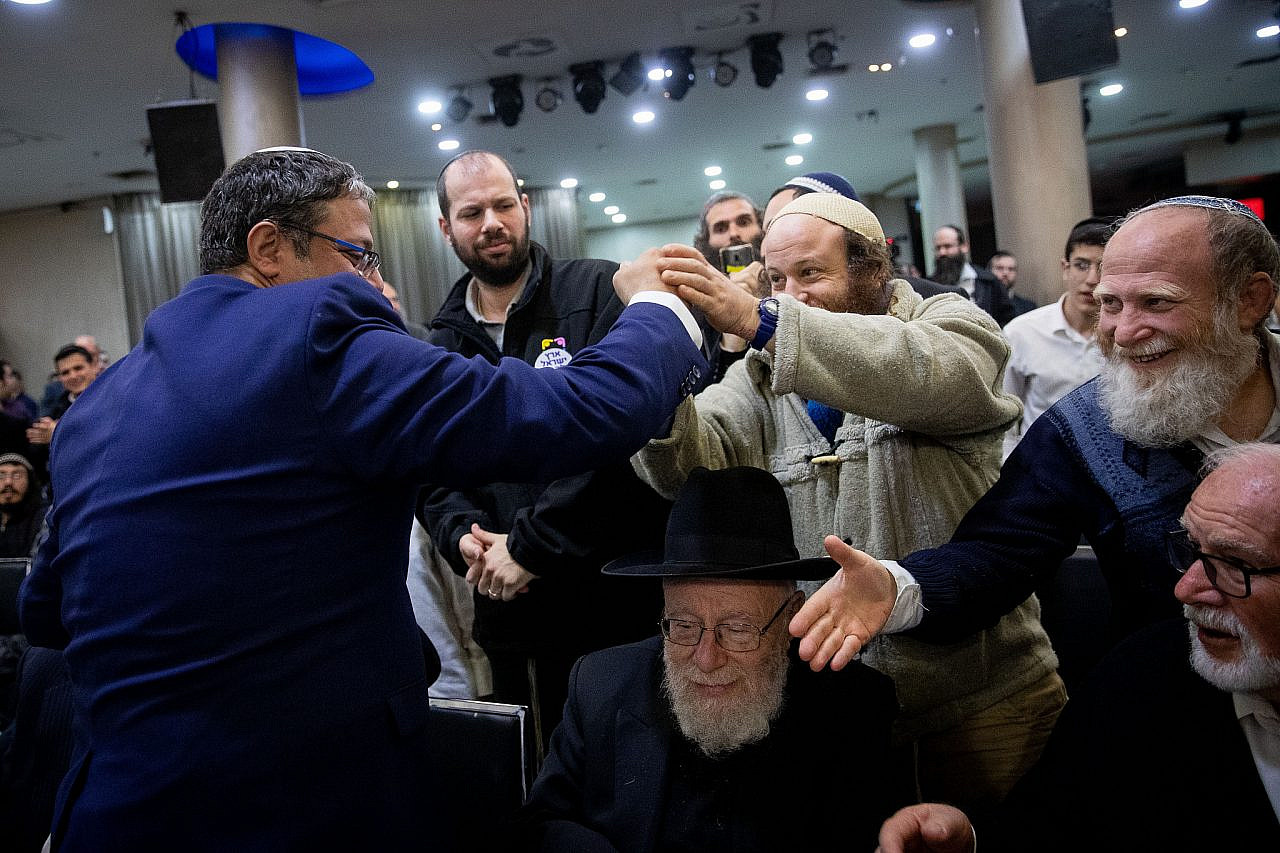
From anti-Zionism to political integration
Before the State of Israel was established, the Haredim were opposed to Zionism — mainly because of its secularity, but in some measure also due to their opposition to the idea of Jewish sovereignty in the Land of Israel prior to the coming of the messiah. But in 1947, when David Ben Gurion was due to testify before the United Nations Special Committee on Palestine (UNSCOP) in favor of the establishment of a Jewish state, he needed first to ensure the support of the Haredim so that they would not recommend a different course of action — such as a pan-Jordanian state with a Jewish protected minority, an idea that was promoted by the Haredi Council of Jerusalem as an alternative to secular Jewish sovereignty.
Ben Gurion turned to Agudat Yisrael — one of two official representatives of the Haredim at the time — with a short missive, known to this day as the “Status Quo” letter, in which he anchored the Jewish Agency’s position on four issues related to religion and its future relations with the state. He chose to approach Agudat Yisrael, which became a party in the First Knesset following the establishment of the state, because it was the more moderate of the two leading groups in Haredi society at the time.
Agudat Yisrael had split from the Haredi Council in 1944 after a confrontation between the members of Agudat Yisrael and Neturei Karta, a group of Haredi Jews that remained opposed to Zionism while other groups adopted a more ambivalent attitude. When Neturei Karta won the internal elections, Agudat Yisrael responded by establishing its own leadership. Those who remained in the Haredi Council, who now number less than 10 percent of the over one million Haredim living in Israel, oppose the existence of the state to this day, and do not participate in elections.
Three different parties now represent Haredim in Israel: the Hasidic Agudat Yisrael, the Lithuanian Degel HaTorah (these two currently run together under the banner of United Torah Judaism), and the Sephardic Shas. Each of these parties can be considered non-Zionist, since they still technically oppose a secular Jewish state on theological grounds, yet they accept the state as a fact on the ground and utilize its power to advance the community’s needs.
The Haredi parties resolve this tension in two ways, both of which are theologically rooted in the idea of preserving the Jewish character of the “Land of Israel.” One concerns government support for the cornerstone of Haredi Judaism, the yeshiva world — the all-male vocational institutions where Talmud is studied from high-school age well into adulthood. The other concerns religious influence over the public sphere: lifecycle events such as marriage, divorce, and death are controlled by an Orthodox, state-sanctioned rabbinate. As a result of this influence, public institutions such as the army are required to adhere to kosher dietary laws, while most public transportation and businesses shut down on Saturdays out of respect for the Sabbath.
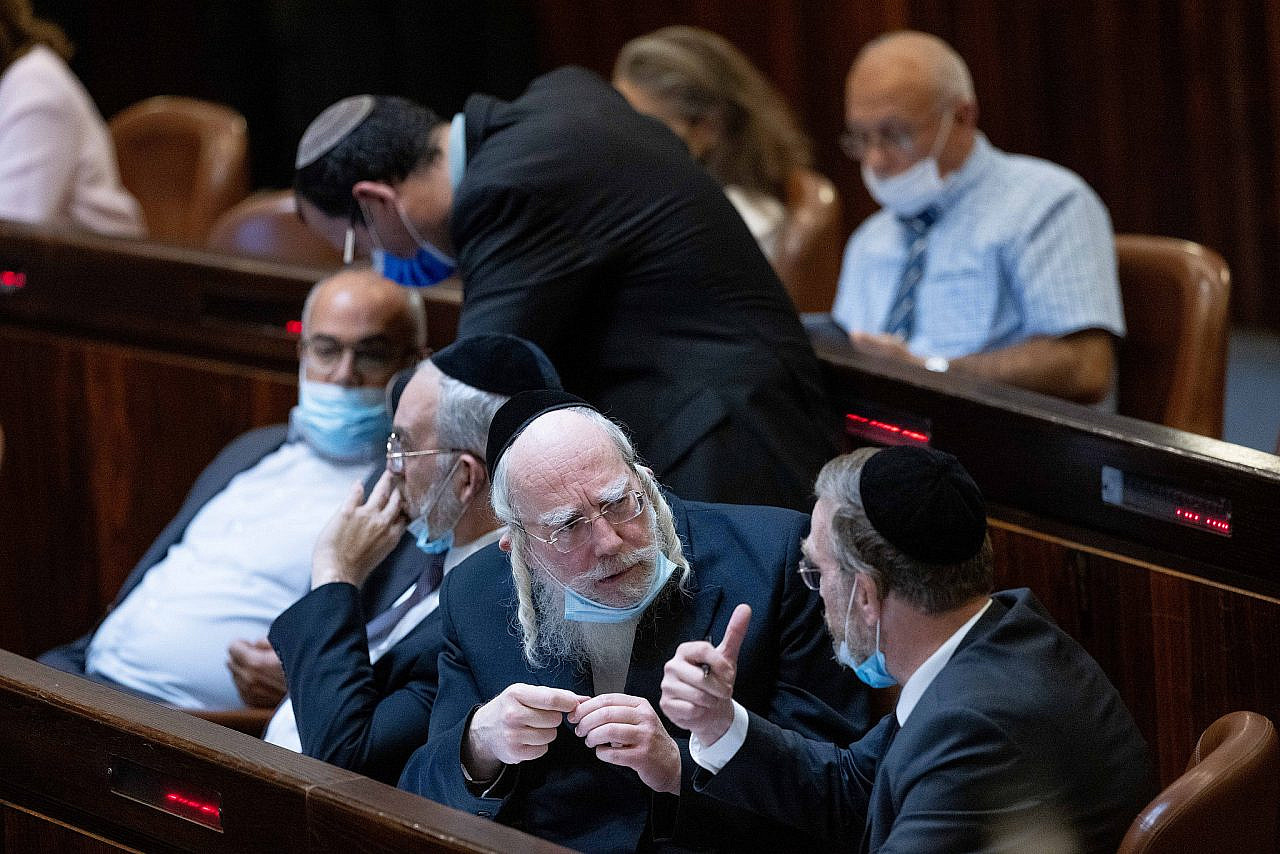
In recent decades, the flagship of religious Zionism — the rabbinate — has also been largely controlled by Haredi politics. This allows them to appoint rabbis, dayanim (Jewish legal authorities), and heads of religious councils as they wish, and outline conservative policies on issues such as personal status, conversion, and Shabbat. Matan Kahana, former Prime Minister Naftali Bennett’s liberal-Orthodox appointment to the religious affairs ministry, ruffled many Haredi feathers during his short tenure in his attempts to liberalize some aspects of the rabbinate.
Coalition agreements with the religious parties have always included a commitment to maintain the status quo on matters of religion and state, or have at least given them veto power over changes vis-à-vis that commitment. As a result, struggles over the expansion of public transportation on Shabbat, and establishing the option of civil marriage (all marriages performed in Israel are under religious auspices, including those of Muslims and Christians), are a constant feature of Israeli politics.
Turning right
In the Knesset, Haredi parties traditionally operate as a lobby, focusing primarily on internal or religion-versus-state issues. They steer clear of state and security policy because they do not view themselves as fully committed to the secular Israeli state, and also because they do not serve in the IDF — a heated issue they prefer to avoid whenever possible. Their official creed is “life over land,” with any territorial concession or agreement to be evaluated according to that measure.
For example, the late Rabbi Ovadia Yosef, the founder and former leader of the Sephardic Orthodox Shas party, supported the Oslo Accords and joined Yitzhak Rabin’s government out of a desire to prevent bloodshed with the Palestinians. The views of Rabbi Elazar Menachem Man Shach, who founded and led Degel HaTorah, matched those of Yosef on Rabin’s “land for peace” vision. However, he felt that the Zionist left was opposed to his religious aspirations and also incapable of bringing about a stable agreement with the Palestinians.
Rabbi Shach effectively cut political ties with the Zionist left in his “Rabbits and Pigs” speech on March 26, 1990, at the Degel HaTorah rally held at Tel Aviv’s Yad Eliyahu Hall. In the speech, he criticized Israel’s secular society — specifically the kibbutzim, which he referred to as “rabbit and pig farms” (non-kosher animals whose consumption symbolizes a break with Jewish tradition) — and announced his refusal to join a Labor-led government, leading to the formation of a narrow right-wing government led by Yitzhak Shamir’s Likud party. This set the stage for a long-term alignment with the Israeli right, which Rabbi Shach viewed as being closer to the Jewish tradition and therefore a natural ally to Degel HaTorah.
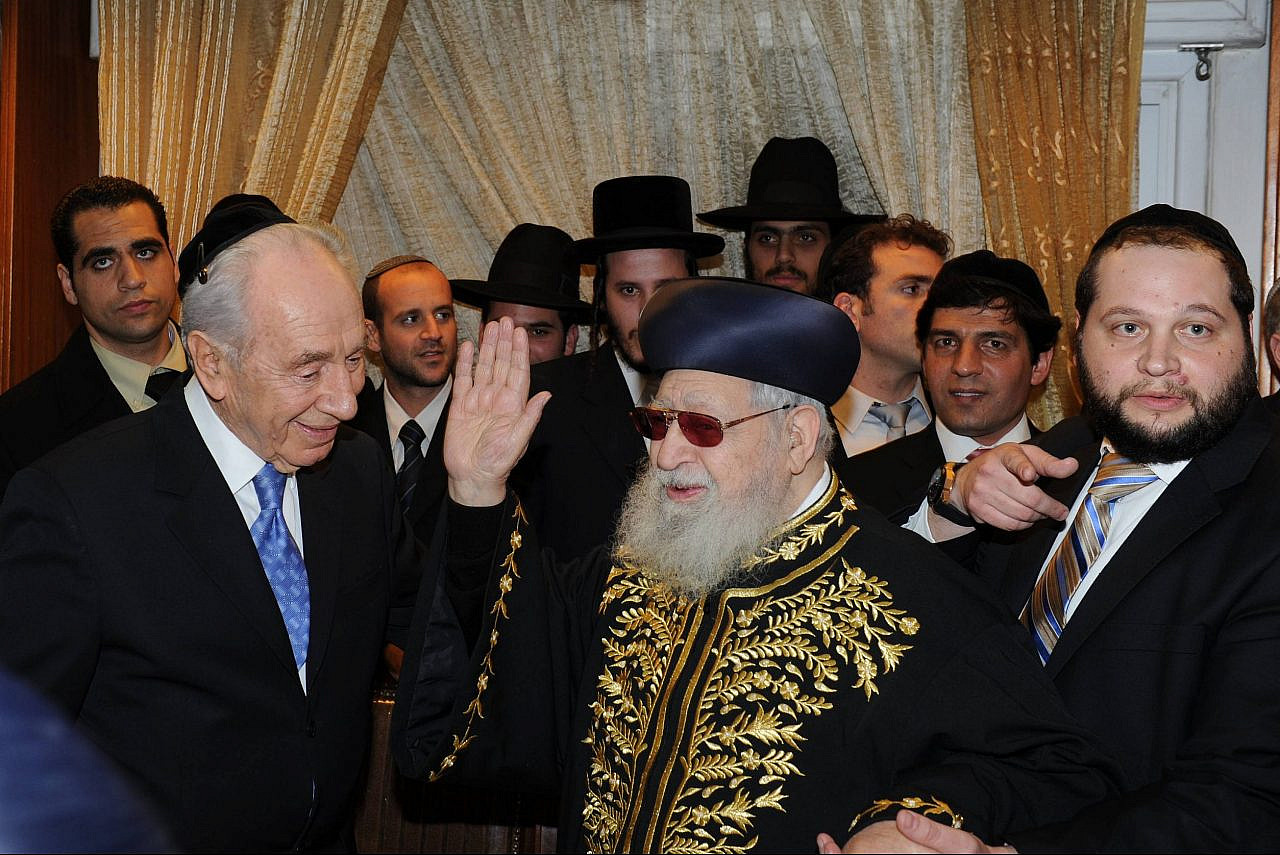
In the run-up to the March 2020 election, I interviewed Yitzhak Pindrus, a Knesset member for the Degel HaTorah party of the United Torah Judaism faction. At the time, Pindrus was leading a very right-wing campaign to garner votes — primarily from Bezalel Smotrich’s Religious Zionism party, which is being steadily co-opted by the Kahanist Itamar Ben Gvir.
When I asked him about his party’s sharp turn to the right, he replied: “In recent decades, it has been proven that the left does not prevent bloodshed. Oslo brought us a bloody intifada, the disengagement [from Gaza, which was not carried out by the left but is often attributed to them by the right] increased the Qassam rockets. If we had returned the Golan [to Syria, as was the subject of diplomatic talks prior to the outbreak of the Syrian Civil War] we would now be closer than ever to ISIS.”
At the same time, Pindrus continued, the left was escalating its “war on [Judaism].” This was helping to drive the religious bloc’s alignment with the right, which is “based on a common struggle against the progressive forces of the left.” The left’s advocacy for religious pluralism — including equal prayer rights at the Western Wall and loosening restrictions on conversions — had, he added, foreclosed any possible cooperation with the Haredi parties. “The war in Israel is between the state of Tel Aviv and the state of Jerusalem,” he concluded.
Pindrus began his political career as mayor of the Haredi settlement city of Beitar Illit in the southern occupied West Bank. The residents of Beitar Illit, which sits just over the Green Line, do not live there for ideological but rather economic reasons: in the 1980s and ’90s, Israel built cities in the occupied territories for Haredim and young people who could no longer afford to live in cities within the Green Line such as Bnei Brak and Jerusalem. Today, the total population of these settlement cities is around 130,000, out of around 600,000 Israelis living beyond the Green Line. Still, when asked if the fact that many Haredim live in the West Bank affects the party’s political position, Pindrus answered unequivocally: “No. We are first and foremost a Torah party and not a national one.”
Unlike the national-religious right, however, Jewish-Arab partnership in the Knesset does not present an ideological or moral challenge for the Haredi leadership. Shas’ Moshe Gafni and Hadash-Ta’al’s Ahmad Tibi do not hide their mutual affection, while the inclusion of Mansour Abbas and his Islamist Ra’am party in the “government of change” is not seen as a red line by some Haredi leaders. Shas, for all its alignment with Netanyahu, has never run an an anti-Arab campaign, and Agudat Yisrael’s Yisrael Eichler recently affirmed — following a spike in attacks by Palestinians in cities inside Israel, including the Haredi Bnei Brak — that Israel’s Arab population are citizens and should be treated as such.
A challenge from within
The political situation created by Netanyahu’s prolonged rule between 2009-21 marked Haredi politicians’ most successful era. Today, however, the Haredi parties are facing a challenge from within their ranks, mainly from younger people. While their political leadership maintains a moderate approach to state issues, officially sticking to their “blood over land” creed (though mostly in the abstract, if such a scenario were to come to pass in the undefined future), the growing “Israeliness” of young Haredim, who are less influenced by rabbinical opinion, has radicalized them and driven them toward the secular and religious right.
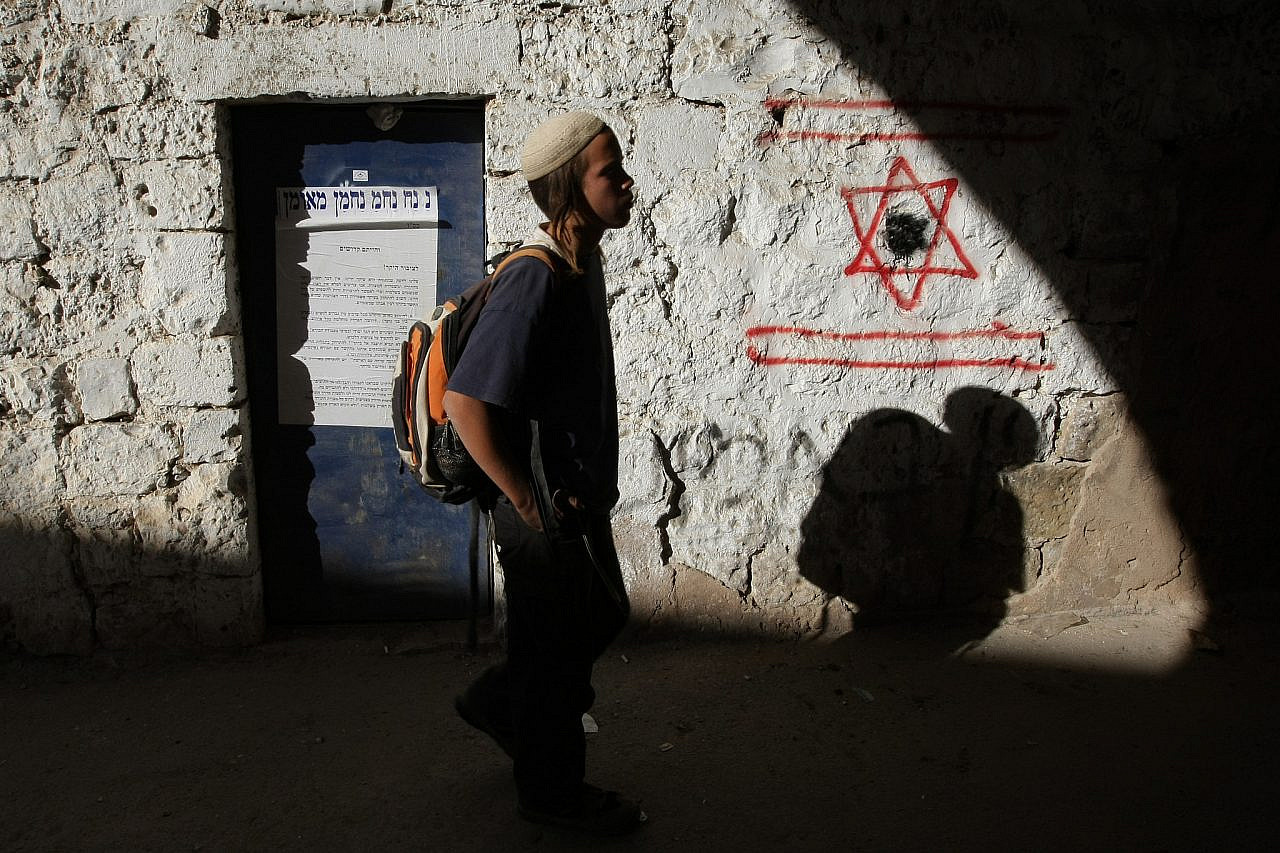
There are several reasons for this. Young Haredim in Israel today are usually third- or fourth-generation Israelis, who accept the reality of a Jewish state and are less interested in theoretical opposition to it. They are also more integrated into Israeli society than ever before — whether that be through military service (Haredim have traditionally refused to enlist and instead receive exemptions, though some serve in specific Haredi units and the state has long been battling to conscript them in larger numbers), higher education, or the workforce. What’s more, the internet and social media have enabled greater exposure beyond the historically closed community.
Some of them even go further than their national-religious counterparts on issues of Jewish supremacy, as demonstrated by the many Haredim who vocally support the Kahanist Itamar Ben Gvir and his Otzma Yehudit party. A large proportion of the approximately 70,000 votes that the Haredi parties lost in the last election were down to people not voting, but many also went to the far right, with Religious Zionism taking 10 percent of the vote in the Orthodox settlement of Beitar Illit.
The Haredi parties were not prepared for this turn of events. They are accustomed to overwhelmingly high voter turnout and are well equipped to conduct get-out-the-vote style campaigns. In typical style, Shas is still using the late Ovadia Yosef’s image, while Degel HaTorah is campaigning on the late Rav Kanievsky’s image in the run-up to the election; Haredi campaigns never sport the images of the actual candidates, but rather of their constituency’s eminent rabbis.
But what happens when loyalty to the rabbinical leadership wavers? What happens when disenfranchised youth seek excitement, meaning, and comfort in far-right politics which, after so many years of Netanyahu’s inflammatory and divisive rhetoric that has been backed by Haredi parties in his government, seems like second nature?
One cannot simply place the responsibility on Netanyahu’s campaigning, as virulent as it is. Haredi culture is separatist at its core: separate education, housing, newspapers, music, even literature and comic books. The large numbers of Haredim in Israel have made it possible to develop a full-fledged counterculture, raising children in an alternative, detached reality that is easily susceptible to racism and fear. Of course, these fears are reinforced by the harsh realities of violent attacks by Palestinians and are bolstered by the complete ignorance — shared by most Israelis — toward the oppression of Palestinians. Now, the Haredi leadership is facing a growing challenge as its youth align with the right wing ideologically, and not only instrumentally.
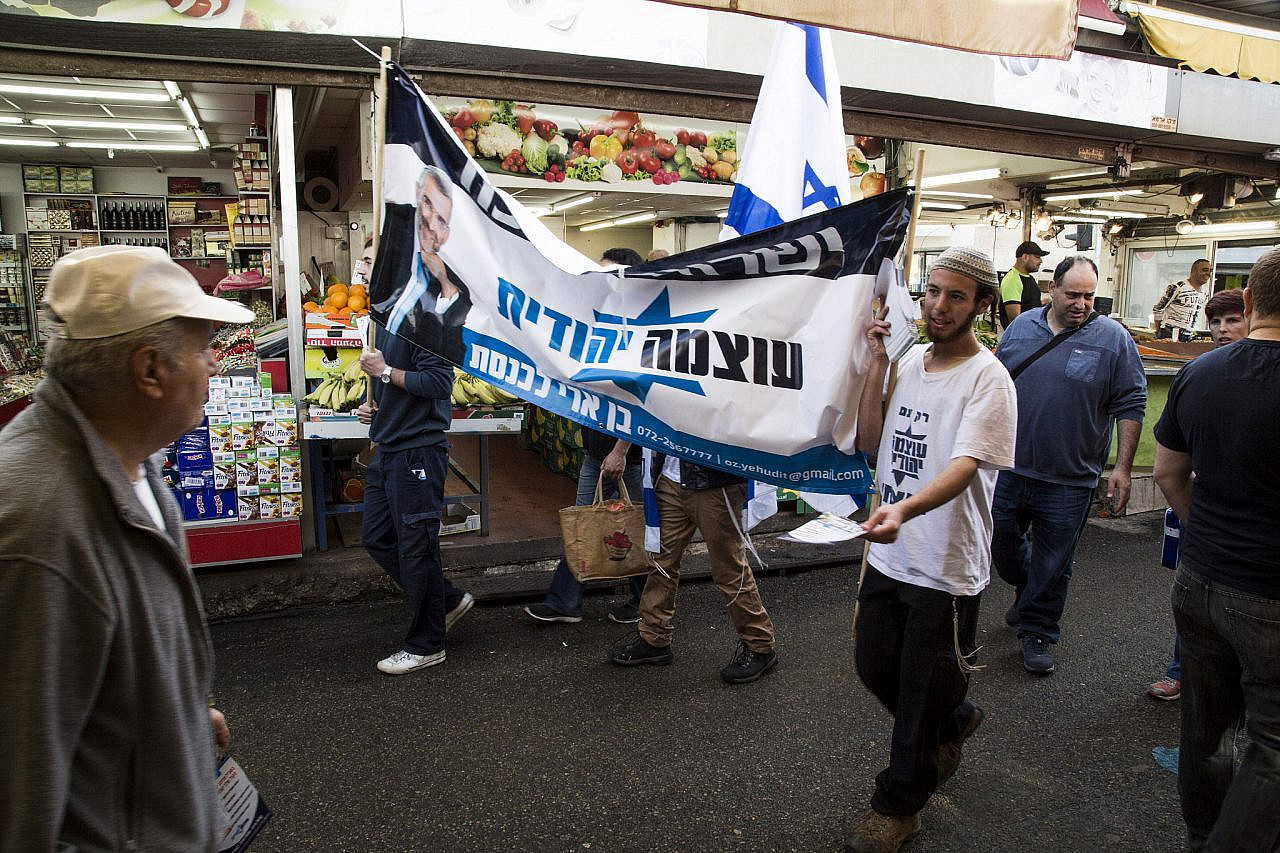
Compounding the rift
While the Haredi parties are more or less split into three equally-sized constituencies, they have not all been radicalized in the same way. Most susceptible is Shas. Haredi Judaism, a European development that grew out of opposition to the Enlightenment and secularism, didn’t become popular among Sephardic Jews until later. Before the Holocaust, Sephardim made up less that 10 percent of world Jewry; they lived mostly in Muslim countries where “modernization” came later than in Europe, and thus retained a more traditional approach and were less militant toward secular trends.
When Shas was formed in the 1980s, it was undoubtedly a Haredi party, but it also concerned itself with socioeconomic mobility and traditional values, while representing Mizrahim who were not fully practicing Orthodox Jews. While the years have chipped away at Shas’ traditional constituency and approach, the party still maintains a more natural affinity with mainstream “Israeliness.” Party leader Aryeh Deri, who once supported Oslo, has become Netanyahu’s staunchest ally, inextricably binding Shas to Bibi’s right-wing bloc. Shas no longer has the political option of supporting anyone but Netanyahu, as many of their voters will abscond to the Likud or other right wing parties if they do so. Its youth, some of them still economically marginalized, feel more comfortable in the warm embrace offered by Ben Gvir and Bezalel Smotrich.
Agudat Yisrael, the Hasidic faction, has also been affected by radicalization. Once the powerful leader of all Haredi Judaism, it is now the underdog overshadowed by the elitist Degel HaTorah, whose rabbis are considered to be the “Gedolim” — the most important rabbinical figures. The party is split into many subfactions, with one of the most prominent, Shomrei Emunim, ideologically right-leaning. The younger generation, which has been priced out of living in central locations, has more independence and less community; they too are looking to the far right for purpose and political representation.
For decades, the Haredi parties have offered Haredim a sense of identity — “I vote, therefore I am Haredi” — in addition to practical assistance with daily affairs. Among the younger generation, however, more people are beginning to feel excluded as they seek better educational opportunities for their children as well as the ability to serve as Haredim in the Israeli army — which right-wing parties can offer them. Alignment with the unabashed rhetoric of Smotrich and Ben Gvir also provides an outlet for frustrations that result from marginalization in the Haredi community, especially among those who feel untethered after dropping out of yeshiva.
The power struggle generated by the changing internal balance of the voter constituencies, which is being closely observed by the parties’ campaigners, is cause for a rift in the Haredi bloc. Netanyahu’s defeat, which saw the Haredim banished to the political desert of the opposition for the past year, has compounded the rift further. Unlike Shas, which has positioned itself as Netanyahu’s right-hand man, the Ashkenazi Haredi parties are more willing to negotiate a coalition deal with whoever comes into power. And where Degel HaTorah maintains its numbers with digital campaigns designed to keep the more open-minded younger generation in its warm embrace, Agudat Yisrael is losing voters to Religious Zionism.
Haredi society still has a way to go until it becomes like its national-religious sister, and this certainly won’t happen under its current leadership. But it would be a fundamental mistake to assume that there is no possibility of major radicalization. With 25 percent of all Jewish schoolchildren in Israel enrolled in the Haredi system, the radicalization of the Haredi sector has the potential to transform Israeli politics as we know it. Confronting it requires a relearning of the Haredi political map, and an investment in political alliances that can steer the Haredi ship that is now sailing on right-wing winds to more moderate land.
